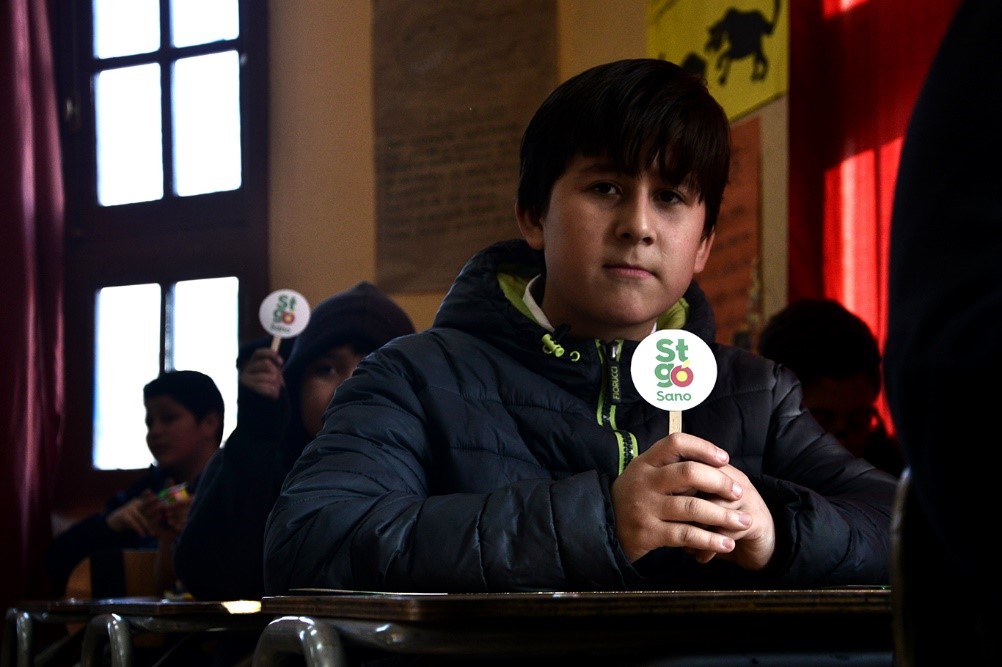Santiago tackles childhood obesity with gamification

City leaders in Santiago, Chile weren’t at all surprised by news out of the United Nations last week – that two-thirds of people in Chile, Ecuador, and Mexico are overweight or obese and that this health crisis could end up costing Chile alone more than $1 billion over the next six decades. “The implications for the future of [these countries] are frightening,” the UN report stated. “Undernutrition is declining, but overnutrition is expected to become the largest social and economic burden in the country.”
Santiago is already tackling this health issue head-on. The city created the Juntos Santiago program as part of Bloomberg Philanthropies’ Mayors Challenge in 2016. As one of the Challenge’s four $1 million prize winners, Santiago Mayor Felipe Alessandri is developing a neighborhood-level competition in which “teams” of 10- to 12-year-olds will be encouraged to choose healthier food options and to exercise more. Each team will select prizes it wants to pursue, such as trips to the pool or new playground equipment, and then earn points toward those prizes based on team members’ healthy choices. If successful, this gamification approach to fighting childhood obesity could transform how cities around the world address the issue.
Although Juntos Santiago is still in the planning stages – and set for an August 7 launch – “the city is already a role model for how to bring a new idea to life, through a combination of experimentation and rigor and with strong support from the mayor,” said Anne Emig, senior program manager for the Mayors Challenge.
We used the release of the UN report as an opportunity to ask Juntos Santiago Program Lead Dr. Sebastián Peña Fajuri how planning for the effort is proceeding.
Dr. Fajuri, how did you arrive at gamification – awarding kids for physical activity and healthy eating – as one of the ways to tackle obesity in Santiago?
People are already exposed to gamification in all different kinds of places – you collect points at the supermarket or gas station, for example. But even though gamification has gone mainstream in the private sector, public policy makers haven’t incorporated it yet.
We [in Santiago] have been thinking about how to improve child nutrition for a long time, and it occurred to us that a lot of messaging is associated with negative feelings – like guilt and obligation. Since motivation is key, we wanted to make encouraging behavioral change fun. So, a few years ago when we had a small pilot to support healthy snacks in schools, we introduced an element of competition. The students were enthusiastic and, at the end of the year, the class won a trip to the swimming pool. Juntos Santiago will build on this work.
Is Juntos Santiago only for children?
We’re using the schools as a platform to reach the whole community. We want parents to have an active role, and we’ll encourage whole families to do activities together. For example, Juntos Santiago will ask parents to work together with their children to make food choices and do activities together, like wearing pedometers.
Scientific evidence shows that nutrition is the most important part of maintaining a healthy weight, so parental engagement will be particularly important for encouraging students to bring healthy snacks to school. Already the school snack kiosks are quite healthy, but we have no control over what food students bring from their homes.
What are the next steps for getting the project off the ground?
Right now we’re dedicating a large amount of time to onboarding new staff and engaging the authorities. We’ve also started the planning process, and have held discussions with the students to test some of our assumptions and eliminate possible roadblocks. This year we will pilot the program in three schools. Next year, we’ll expand to 15 schools; and the third year, we will expand to all 70 [elementary] schools in Santiago. When the project is complete, we expect to have 90 percent participation and hope to reduce obesity – as measured by the body mass index – and spark behavior change – which will be measured by the reduced consumption of unhealthy snacks and an increase consumption of fruits and vegetables.